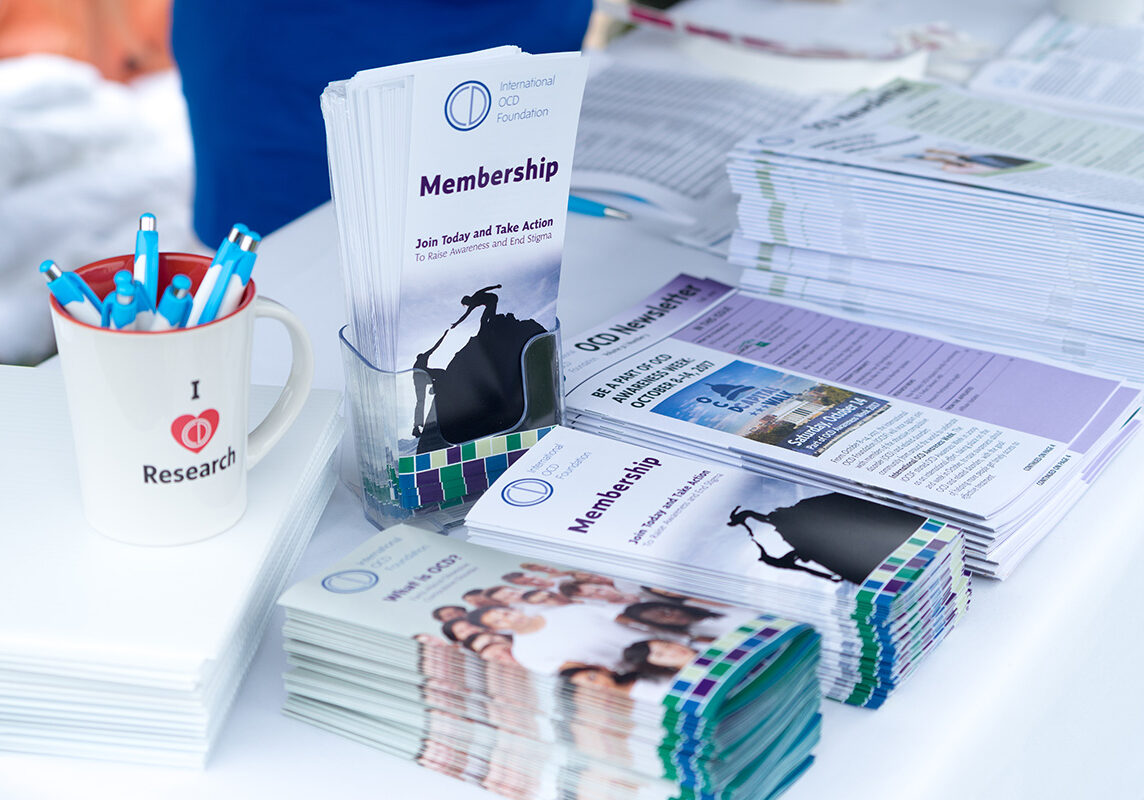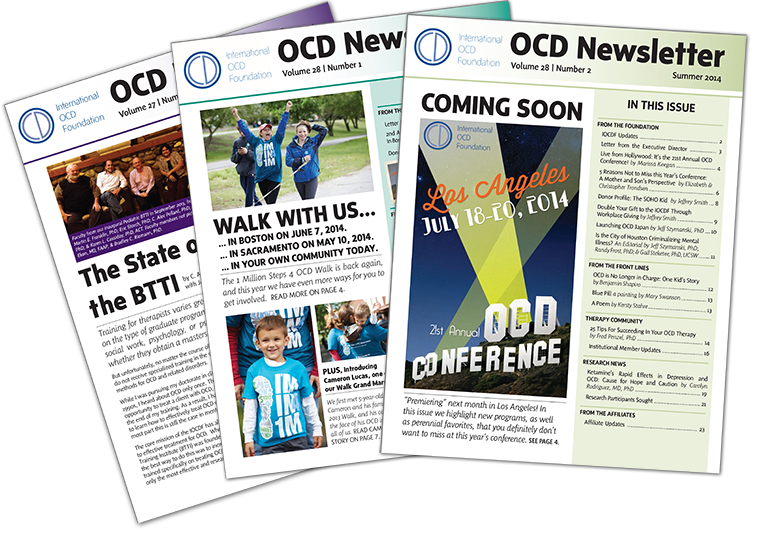There are various educational resources available for understanding and managing OCD. From expert articles, to books and multimedia, view our full list of resources below.

Articles From the Experts
The articles in this section were written by mental health professionals and researchers who are experts in OCD and related disorders. Topics covered include Subtypes of OCD, Co-Occuring Disorders, OCD Treatment, Family Issues, and more!
Brochures, Fact Sheets, and Handouts
View educational brochures, fact sheets, and handouts for OCD and related disorders. Collateral is available in multiple languages and can downloaded for print.
Books and Multimedia Resources
There are many books available these days about OCD and related disorders, in addition to various DVDs and online toolkits that may be helpful. These resources have not been reviewed, and are not necessarily endorsed by the IOCDF.
OCD Newsletter and Archive
The OCD Newsletter is a source of news and inspiration to individuals with OCD, their loved ones, and to OCD professionals and researchers. Subscription to this quarterly publication and Newsletter Archive is one of the many benefits of membership with the IOCDF.
Additional OCD Resources
OCD Websites, Blogs & Podcasts
- OCDChallenge: OCD Challenge is a free online, interactive, behavioral program designed to help people suffering from OCD.
- TreatMyOCDBlog: Stories, infographics, and information about OCD shared from members of the OCD community.
- OCD Stories on The Mighty: The Mighty is a story-based health community focused on improving the lives of people facing disease, disorder, mental illness, and disability.
- Beyond the Doubt: As part of Psychology Today's blogging network, OCD advocate Jeff Bell offers his inside perspective on life with OCD and the lessons of uncertainty.
- HistoryofOCD: This brief history aims to tell the story of the people who suffered from OCD* in past times, and of the people who sought to understand and treat their perplexing illness.
- The OCD Stories: A recovery focused podcast interviewing the best minds in OCD to help people live their best life!
- Your Anxiety Toolkit: This podcast aims to provide the community with helpful tools to manage anxiety, stress and other emotions that get in the way.
Resources For Parents
- Anxious Toddlers: A series of in-depth, online training courses for parents who have a child living with OCD. The courses were created by IOCDF Professional Member, Natasha Daniels, LCSW. There are two full courses available, How to Teach Your Kids to Crush Anxiety & Parenting Kids with OCD. There is also a mini-course, Misperceptions About OCD in Children.
Referral Sources and Advocacy Groups
- Academy of Cognitive Therapy
Phone: (215) 831-7838
Email: info@academyofct.org
Website: academyofct.org - American Academy of Child and Adolescent Psychiatry
Phone: (202) 966-7300
Website: aacap.org - American Foundation for Suicide Prevention
Phone: (888) 333-2377
Email: info@afsp.org
Website: afsp.org - American Psychological Association
Phone: (800) 374-2721
Website: apa.org - Anxiety & Depression Association of America
Phone: (240) 485-1001
Email: information@adaa.org
Website: adaa.org - ASPIRE (a PANDAS/PANS organization)
Email: info@aspire.care
Website: aspire.care - Association for Behavioral and Cognitive Therapies
Phone: (212) 647-1890
Website: abct.org - Beyond OCD
Phone: (773) 661-9530
Email: info@beyondocd.org
Website: beyondocd.org
- CBT School
Website: cbtschool.com - Clutterers Anonymous
Phone: (866) 402-6685
Website: clutterersanonymous.net - Freedom From Fear
Phone: (718) 351-1717
Email: help@freedomfromfear.org
Website: freedomfromfear.org - Mental Health.gov
Website: mentalhealth.gov - Mental Health America
Phone: (800) 969-6642
Website: mhanational.org
- National Alliance on Mental Illness
Phone: (800) 950-6264
Website: nami.org - National Disability Rights Network
Phone: (202) 408-9514
Email: info@ndrn.org
Website:ndrn.org - National Institute of Mental Health
Phone: (866) 615-6464
Email: nimhinfo@nih.gov
Website: nimh.nih.gov
Live Chat (available M-F, 8:30am – 5:00pm EST) - National Suicide Prevention Lifeline
The 988 lifeline is free one-on-one assistance for everyone anytime 24/7/365. Text, Call, Chat, Deaf/HoH
Website: https://988lifeline.org/ - Obsessive Compulsive Anonymous (OCA)
Phone: (516)739-0662
Website: obsessivecompulsiveanonymous.org - The OCD Challenge
Website: ocdchallenge.com - PANDAS Physicians Network
Email: support@pandasppn.org
Website: pandasppn.org - PANDAS Network
Email: pandasnetwork@gmail.com
Website: pandasnetwork.org - PickingMe Foundation
Phone: (312) 964-5388
Website: pickingme.org - Relief Resources
A non-profit organization that provides multiple services to individuals in the Jewish community suffering from mental health disorders.
Phone: (718) 431-9501
Email: info@reliefhelp.org
Website: reliefhelp.org - Tourette Association of America
Phone: (718) 224-2999
Website: tourette.org - The TLC Foundation for BFRB's
Phone: (831) 457-1004
Email: info@bfrb.org
Website: bfrb.org
Prescription Assistance
- Needy Meds
Email: info@needymeds.com
Website: needymeds.org
Phone: (800) 503-6897 - Partnership for Prescription Assistance
Phone: (888) 477-2669
Website: pparx.org
Legal and Employment Resources
- Americans with Disabilities Act
U.S. Department of Justice
Phone: (800) 514-0301
Website: ada.gov - Bazelon Center for Mental Health Law
Phone: (202) 467-5730
Email: communications@bazelon.org
Website: bazelon.org - Individuals with Disabilities Act (IDEA)
Website: idea.ed.gov - Office of Disability Employment Policy
U.S. Department of Labor
Phone: (866) 487-2365
Website: dol.gov/odep
Insurance Assistance
- Health Insurance Marketplace (under the Affordable Care Act)
Phone: (800) 318-2596
Website: healthcare.gov - Medicare Rights Center
Phone: (800) 333-4114
Website: medicarerights.org
Email: info@medicarerights.org
Professional Associations
- Academy of Cognitive Therapy
Phone: (215) 831-7838
Email: info@academyofct.org
Website: academyofct.org - American Academy of Child and Adolescent Psychiatry
Phone: (202) 966-7300
Website: aacap.org - American Psychiatric Association
Phone: (888) 357-7924
Email: apa@psych.org
Website: psychiatry.org - American Psychological Association
Phone: (800) 374-2721
Website: apa.org - Anxiety & Depression Association of America
Phone: (240) 485-1001
Email: information@adaa.org
Website: adaa.org - Association for Behavioral and Cognitive Therapies
Phone: (212) 647-1890
Website: abct.org



